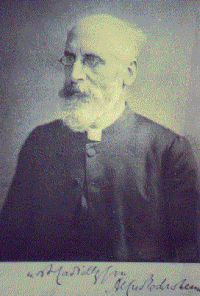
Dr. Alfred Edersheim
Rev. Dr. Alfred Edersheim, born at Vienna, March 7, 1825, died at Mentone, March 16, 1889. We give the following extract about him from the Memoir of Dr. Saphir, by Rev. G. Carlyle:
In 1847 young Edersheim became a student at the University of Buda-Pest. He had been brought up luxuriously in Vienna, and was one of the leaders of fashion. He was highly educated, spoke Latin fluently, knew Greek, German, French, Hebrew, Hungarian and Italian. When Cremieux, the head of the French bar, paid a visit to Vienna, the synagogue presented him with an address, and deputed young Edersheim to deliver it. Cremieux was so pleased with his eloquence that he offered his father to take his son to Paris, and provide for him for life, but his parents would not give him up…
Before the winter was over, Edersheim was under the teaching of the Holy Spirit, and had glorious views of the Deity of Christ. Trusting in His One Sacrifice, and filled with the peace of God, he gave himself up to be His servant in any way it might please God to direct him. He opened a class to teach the students English on the condition that the Bible should be their only lesson book. Baptized, and now full of life and vigour, it was resolved that he should go to Edinburgh, to the Rev. Professor Duncan, to complete his theological studies.
Edersheim, after his ordination, was missionary first in Jassy, Roumania, and then minister for many years at the Free College Church, Old Aberdeen, and then at Torquay… He then joined the Church of England and became Vicar of Loders in Dorset.
He resigned his living in 1883, and settled at Oxford, where he held the position of Grinfield Lecturer of the University. He was also Warburton Lecturer of Lincoln’s Inn, and “Select Preacher” of the University of Oxford.
Dr. Edersheim was a voluminous author, and his works are extremely valuable from the fact that he was able to deal with his subject both from the standpoint of a learned Jew and a learned Christian. It may be as well to state here his total output, from which it will be seen how wide and extensive was his range of study and scholarship. He was Translator and Editor of the “History of Speculative Philosophy from Kant to Hegel, from the German of Dr. Chalybäus, with introduction by Sir Wm. Hamilton” (Edinburgh); “Kurtz, History of the Old Covenant (vol. 1) with condensed abstract of Kurtz’s Bible and Astronomy;” “Lange, Bible Commentary on St. Matthew” (2 vols.); “Kurtz, History of the Christian Church, with emendations and additions” (Edinburgh, 1860); Author of “History of the Jewish Nation from the Destruction of Jerusalem to the Establishment of Christianity in the Roman Empire” (T. and T. Clark, 1856. Revised by Rev. H. A White. Longmans, 1896); “The Golden Diary of Heart-Converse with Jesus in the Book of Psalms” (R.T.S.); “Elisha the Prophet, his History and Times” (R.T.S.); “The Jubilee Rhythm of St. Bernard,” and other Hymns, chiefly from the Lation (J. Nisbet and Co., 1866); “The Temple, its Ministry and Services as they were at the time of Jesus Christ” (R.T.S., 1874); “Sketches of Jewish Social Life in the days of Christ” (London, 1876); “Bible History,” 7 vols. (R.T.S.); “The Life and Times of Jesus the Messiah,” 2 vols. (Longmans, 1884; eighth edition, 1894); “Jesus the Messiah,” and abridged edition of the foregoing; “Prophecy and History in relation to the Messiah, being the Warburton Lectures for 1880-1884” (8 vols., Longmans, 1885); “Commentary on Ecclesiasticus,” in “The Speaker’s Commentary on the Apocrypha” (J. Murray, 1888); “Tohu-va-Vohu (Without form and void),” a collection of Fragmentary Thoughts and Criticisms, edited by his daughter (Longmans, 1890), and various articles from time to time in the “Edinburgh Review.” He was also editor of “Israel’s Watchman” in 1877.
Bernstein, A. 1999. Jewish Witnesses for Christ. Jerusalem: Keren Ahvah Meshihit.

